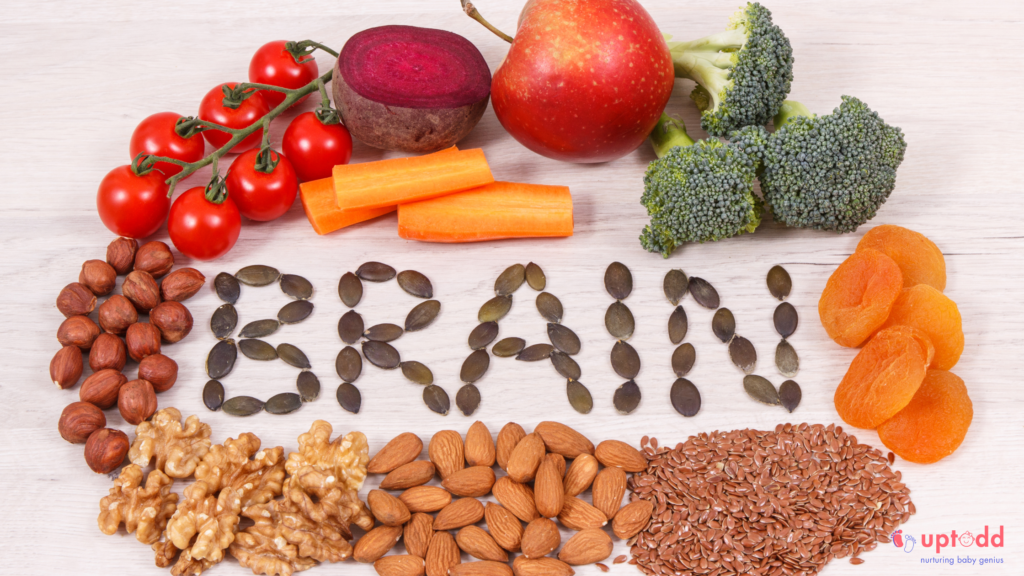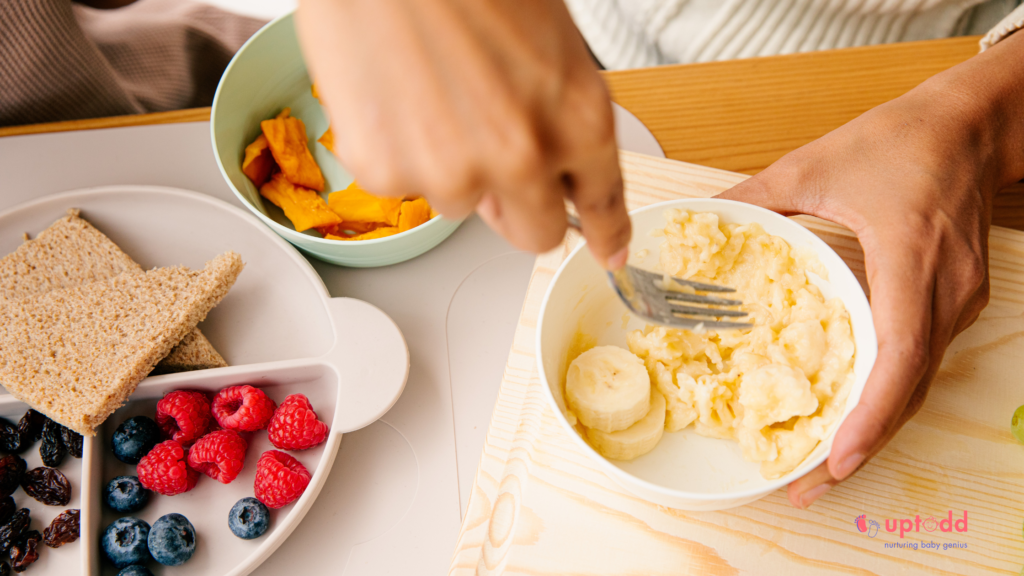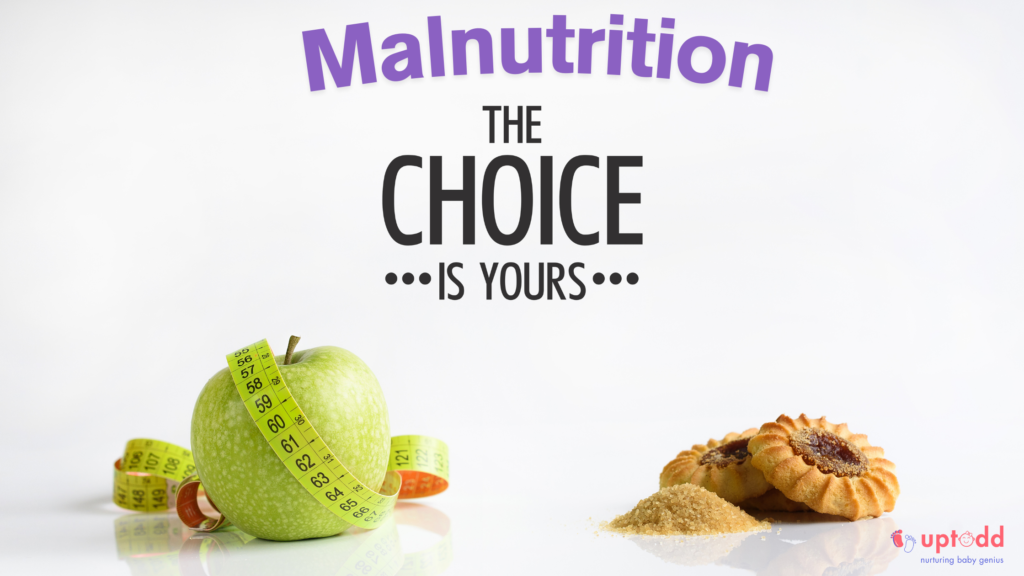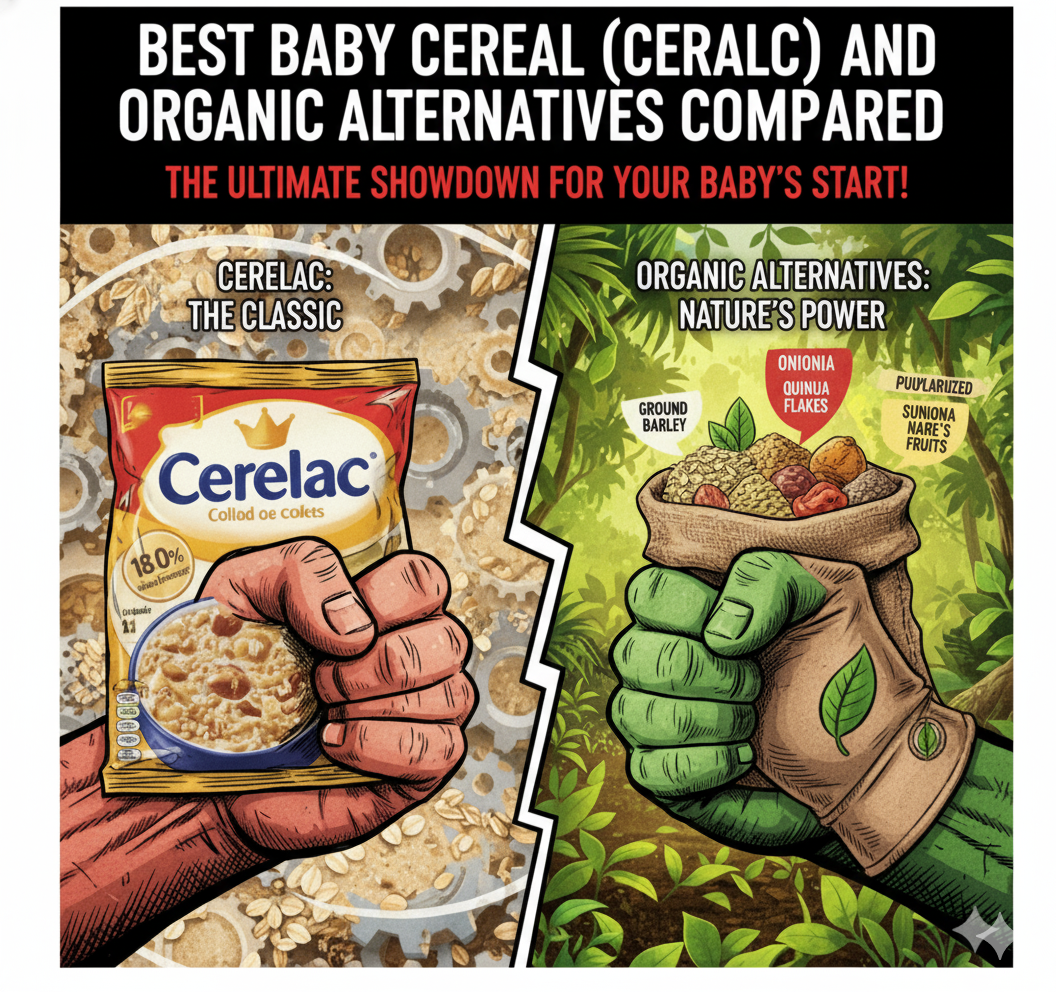
Brain Development Food for Babies : Essential Nutrition by Age
Topic
Brain Development Food for Babies : Essential Nutrition by Age
May start as early as
Birth
─────────
May end around
Always required
Related Skills
Baby diets, Bonding, Memory, Gross Motor Skills, Sitting,
Standing, imagination, independence
Brain Development Food for Babies : Essential Nutrition by Age
Proper nutrition fuels your baby’s brain growth from day one. This guide explores the best brain development foods for babies by age group, from prenatal to toddlers. Learn what nutrients matter, which foods to prioritize, how to build balanced meals, and how food shapes cognitive growth.
So, the big question is: why is food so important for your little one? What really happens if certain nutrients are missing from your baby’s diet? And why should you focus on proper nutrition when your baby seems just fine drinking milk and nibbling here and there?
Let’s explore the answers together..
In this blog, we will discuss-
- Why Brain Nutrition Starts at Birth (or Before)
- Age Wise Guide: Brain Development Foods for Babies
- Long-Term Impact of Poor Brain Nutrition
- FAQs
First of all, let’s begin with
Tiny tummies, big needs! See the ultimate 0-3 baby food chart and must-have nutrients now!

Uptodd Cereal is Live Now !!
Why Brain Nutrition Starts at Birth (or Before)
Did you know that by age 2, a baby’s brain reaches 80% of its adult size?
That incredible growth requires intense energy and nutrition, especially in the first 1,000 days, from conception to age two. Every neuron, synapse, and milestone depends on fuel: the right brain-building foods.
Whether you’re breastfeeding, starting solids, or planning your toddler’s meals, every spoonful counts toward building memory, attention, and emotional strength.

How Food Fuels Brain Development in Babies
A baby’s brain uses over 50% of total energy in early life. To support this rapid development, the brain needs:
| Nutrient | Role in Brain Development | Sources |
|---|---|---|
| DHA (Omega-3) | Builds neuron membranes | Breastmilk, fish, flax seeds |
| Iron | Delivers oxygen to brain | Lentils, spinach, egg yolk |
| Zinc | Supports brain structure & immunity | Chickpeas, dairy, oats |
| Choline | Forms memory pathways | Eggs, liver, soybeans |
| Iodine | Makes thyroid hormones | Iodized salt, seaweed |
| B Vitamins | Fuel cell energy & nerve growth | Whole grains, dairy |
| Protein | Builds neurotransmitters | Lentils, paneer, tofu |
Without these, brain connections slow, attention lags, and cognitive development can be impaired.
Age Wise Guide: Brain Development Foods for Babies
At this stage, exclusive breastfeeding (or formula feeding) is the gold standard. Breastmilk provides:
- DHA for brain & retina development
- Lactose for energy
- Bioavailable iron, zinc, and choline
- Antibodies for immune and gut health
Formula milk (iron-fortified) is also a safe option, just ensure it’s age-appropriate and properly prepared.

Avoid giving solid foods, water, juice, or cow milk before 6 months.
Related: Brain Development Food for Unborn Baby →
6–12 Months: First Solids = First Brain Foods
At 6 months, babies can start solids, and it’s a critical window to offer nutrient-dense foods that fuel cognitive and motor milestones.
Key nutrients for 6-12 months:
- Iodine: regulates growth hormones
- Omega-3 fatty acids: sensory processing
- Iron: prevents developmental delays
- Zinc & Choline: for brain structure and memory
- Vitamin D: supports mood and teething
Sample Foods (6–12 months):
| 6–8 Months | 9–12 Months |
|---|---|
| Mashed banana, papaya, chikoo | Steamed carrots, spinach, peas |
| Moong dal water, khichdi | Paneer, tofu, mashed beans |
| Ragi, oats, soft rice | Idli, dosa, roti mashed in dal |
| Breastmilk/formula | Continued, but reduced |
| Water (80–200 ml/day) | Sippy cup / spoon feeding |
Feeding Tips:
- Introduce 1 food at a time for 3 days (allergy test)
- Begin with 1–2 meals/day → gradually increase
- Avoid salt, sugar, honey, and cow’s milk
- Encourage self-feeding with finger foods
- Include flax seeds, walnuts, and chia seeds for DHA (if vegetarian)
Related: Brain Food for 6-Month Babies →
Related: Food for 9-Month Baby’s Brain →

12–24 Months: Balanced Meals for Brain Growth
From 1 year onwards, babies need 3 full meals + 2 snacks daily. They’re rapidly developing vocabulary, memory, coordination, and social skills, all of which require quality brain food.
Essential Foods for 1-2 Years:
- Eggs (choline, protein)
- Lentils, beans, tofu (iron, zinc, protein)
- Leafy greens, pumpkin (vitamins A, K, iron)
- Full-fat dairy (calcium, B12, healthy fats)
- Fish like salmon (DHA, protein)
- Whole grains (B vitamins)
Sample Snack Ideas:
- Boiled egg + banana
- Vegetable sticks with hummus
- Paneer paratha with curd
- Nut powder mixed in porridge
- Mashed sweet potato with ghee
Related: Brain Development Food for Babies at Age 1 →
Brain Development Continues: 2 – 4 Years & Beyond
As toddlers grow, their brain develops executive functions: impulse control, reasoning, memory.
Ensure:
- DHA-rich foods 2–3x/week
- No processed snacks
- Consistent mealtimes
- Daily fruits & vegetables
- Breastfeeding
👉 Read about food chart guide for 0-3 years
Related: Brain Development Food for 3-Year-Olds →
Related: Brain Development Food for 4-Year Baby →
Long-Term Impact of Poor Brain Nutrition
If babies lack brain-building nutrients:
- Cognitive lag: slower learning, attention issues
- Poor school readiness: lower memory & language skills
- Emotional imbalance: anxiety, mood dysregulation
- Weakened immunity
Even short-term deficiencies (e.g. iron deficiency anemia) in early life can cause irreversible changes in brain function. This makes early nutrition non-negotiable.

How Parents Can Support Brain Development Through Food
Top tips:
- Sit with your baby at mealtime to encourage learning
- Begin solids with iron-rich foods first
- Include healthy fats (ghee, nuts, seeds)
- Avoid sugar, salt, and additives before age 2
- Cook meals fresh; avoid packaged baby foods
- Rotate foods to build a diverse nutrient profile
Common FAQs on Brain Development Food for Babies
When should I introduce brain foods to my baby?
From birth, breastmilk is the first brain food. At 6 months, begin iron- and fat-rich solids.
Can food improve intelligence?
While food doesn’t guarantee IQ boosts, nutrient-rich diets improve brain function, focus, and memory — essential for learning.
What foods should be avoided?
Avoid cow milk (before 1 year), sugar, salt, processed snacks, honey (risk of botulism), and juice.
What if my baby is vegetarian?
Flax seeds, chia, walnuts, and fortified cereals can provide DHA and iron substitutes.

Conclusion: Brain Food = Brain Power
From the womb to toddlerhood, your baby’s brain is shaped by what you feed it. By choosing the right foods — at the right time — you set the stage for lifelong learning, focus, and emotional well-being.
🍲 Every meal is an opportunity to nourish your child’s future.
Unlock their potential: What to buy your baby from 0 to 3 years.
Do you want to know how to make the baby to gain weight – Tap Here
6 month baby food Complete Guide
Explore UpTodd to unleash the baby’s hidden abilities.
Research & Resources
- https://www.uclahealth.org/news/article/baby-brain-food-7-foods-to-fuel-brain-development#:~:text=Protein%20contributes%20to%20healthy%20brain,memory%20and%20ability%20to%20learn.
- https://www.gov.nl.ca/healthyeating/baby/offering-healthy-foods/what-foods-should-i-offer-my-baby/vegetables-and-fruit/
- https://www.nhs.uk/start-for-life/baby/weaning/what-to-feed-your-baby/from-around-6-months/
- https://www.healthychildren.org/English/ages-stages/baby/feeding-nutrition/Pages/sample-one-day-menu-for-an-8-to-12-month-old.aspx
- https://www.nhs.uk/start-for-life/baby/weaning/what-to-feed-your-baby/over-12-months/






